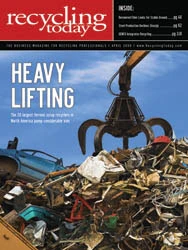Losing While Winning
For the past decade or two, Americans have been scolded by economists, professors and elected officials about several of their addictions, including to energy and oil, to debt and lines of credit and to spending rather than saving.
Whether because they have been pressured financially to do so or because they have made the choice, an increasing number of American households and businesses have weaned themselves from some of these alleged addictions.
That should be good news: Beating an addiction is generally considered a triumph of the spirit and a first step toward something better.
But while an economic theorist may applaud a higher national savings rate, lower average household debt and declining energy use, what these changes in behavior also have created is a much slower pace of economic activity.
Steelmakers and the scrap recyclers who supply them are among those having to make difficult choices to be able to move forward at this slower pace. As of March 2009, steel mills in the United States are producing on a weekly basis approximately half the amount of steel they were producing one year ago.
The lack of demand for steel is a reflection of the lack of demand for new vehicles, major appliances and other types of durable goods that are most commonly purchased with installment loans, credit cards and, throughout this decade, home equity loans.
Idled mills or ones melting on a lighter schedule also consume less energy, putting them in a common category with other businesses moving at a slower economic pace. Again, that has been portrayed as a goal: to consume less energy.
But for iron and steelmakers in the short run, this has provided another setback with the tapering off of North American oil drilling activities (and demand for pipe and tube). Similarly, smaller vehicles preferred for energy savings use less steel as well.
Analyzing winners and losers over time is more complicated. Ultimately, having financially sound households and energy options not tied directly to overseas oil resources are still likely deemed desirable by most observers—in the long run.
When recyclers gather for the Institute of Scrap Recycling Industries Inc. (ISRI) Annual Convention and other events this spring, however, discussions are likely to focus on the dramatic declines in their economic sector now and in the past six months.
It is less likely that conversations will center on the 2015 personal savings rate or the 2012 energy consumption patterns of drivers, households or manufacturing plants.
As of the first quarter of 2009, it is difficult for makers of basic materials and suppliers of secondary raw materials to look very far forward. It is probably equally difficult to feel a strong sense of accomplishment in conquering the perceived addictions and excesses of earlier this decade.

Explore the April 2009 Issue
Check out more from this issue and find your next story to read.
Latest from Recycling Today
- Aqua Metals secures $1.5M loan, reports operational strides
- AF&PA urges veto of NY bill
- Aluminum Association includes recycling among 2025 policy priorities
- AISI applauds waterways spending bill
- Lux Research questions hydrogen’s transportation role
- Sonoco selling thermoformed, flexible packaging business to Toppan for $1.8B
- ReMA offers Superfund informational reports
- Hyster-Yale commits to US production





